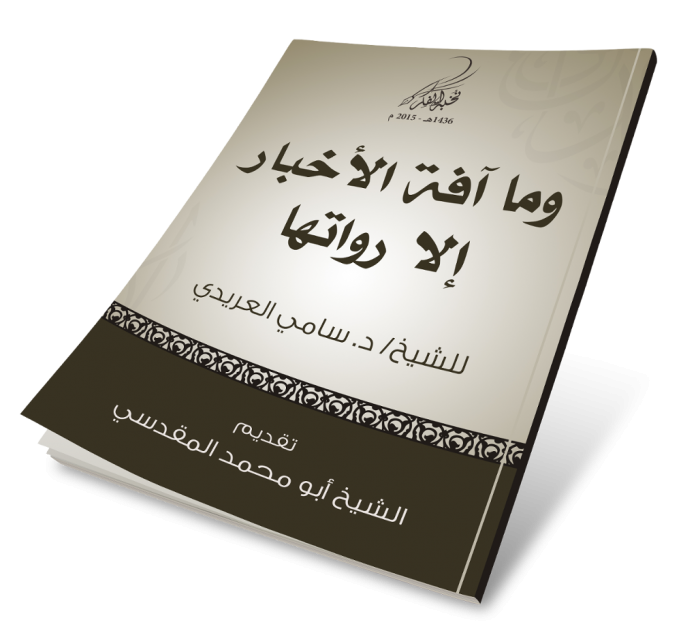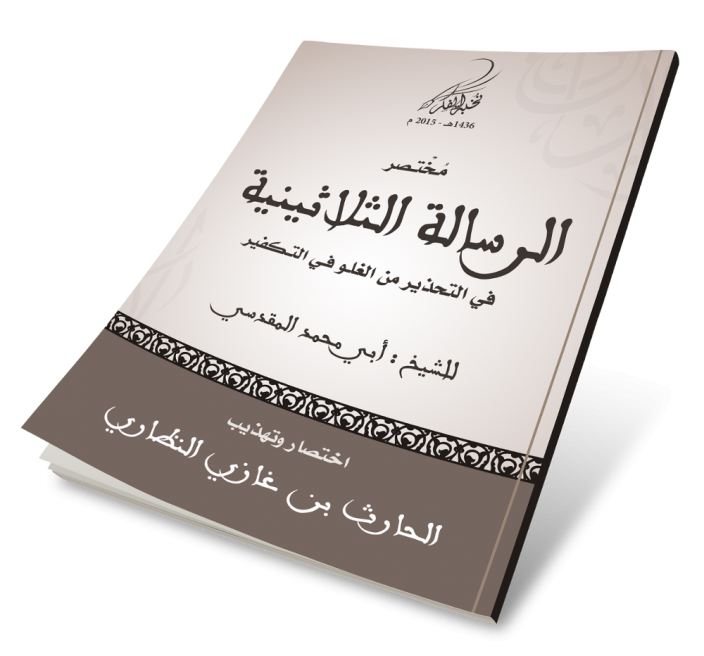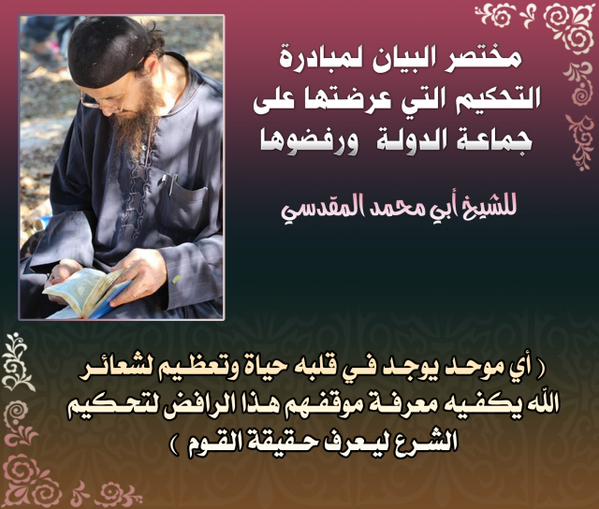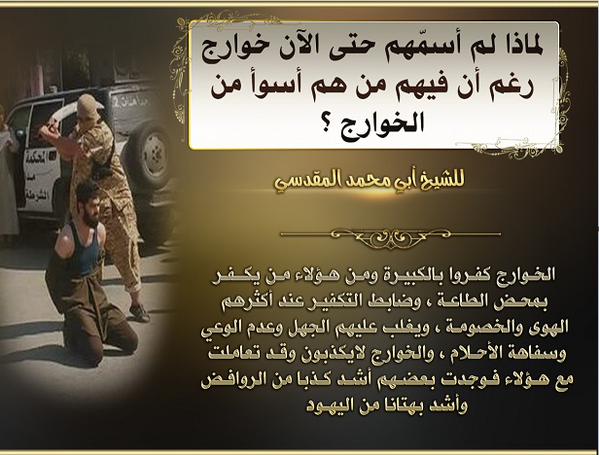
Click the following link for a safe PDF copy: Dr. Sāmī al ‘Uraydī — “The Ills of the News Are Their Narrators”
____________________
To inquire about a translation for this release for a fee email: [email protected]
Category: Abū Muḥmmad al-Maqdisī
Majmu’ah Nukhbat al-Fikr presents a new release from Shaykh Abū Muḥammad al-Maqdisī: "The Thirtieth Message In Warning From the Extremists In [the Use] of Takfīr"

Click the following link for a safe PDF copy: Shaykh Abū Muḥammad al-Maqdisī — “The Thirtieth Message In Warning From the Extremists In [the Use] of Takfīr”
________________
To inquire about a translation for this release for a fee email: [email protected]
New release from Shaykh Abū Muḥammad al-Maqdisī: "Answering of the Question About the Lawsuit of an Assailant For Legitimate Arbitration and His Takfīr of Other Factions"
Click the following link for a safe PDF copy: Shaykh Abū Muḥammad al-Maqdisī — “Answering of the Question About the Lawsuit of an Assailant For Legitimate Arbitration and His Takfīr of Other Factions”
________________
To inquire about a translation for this statement for a fee email: [email protected]
New article from Shaykh Ḥussayn bin Maḥmūd: "With Shaykh al-Maqdisī"
بسم الله الرحمن الرحيم
نقل بعض الإخوة الأفاضل تعليق الشيخ أبي محمد المقدسي – وفقه الله – على كلام كتبته في المقالة السابقة بعنوان “نصيحة الجاني على كلمة العدناني” ، وقد كتب الشيخ أبو محمد – وفقه الله – التالي :
1- التعصّب جعل أحدهم يُرقّع لتكفير العدناني كل من يقاتله فتمسّك بقوله (تقع في الكفر) فجعل مقالة العدناني تكفيراً للعمل واتهم من جعلها للأعيان بالتدليس!
2- فركّز على ما ظنّه يرقّع إطلاق العدناني وباطله وأغضى عن قوله الصريح الذي لا يترقّع قبلها : (إنك تكفر بذلك) فمن الذي دلّس ومن الذي جداله لا يساوي فلساً؟
3- ويصف المجادل طامة العدناني بقوله : (جملة صغيرة) ومن انتقدها (شرّق وغرّب). لا تنظر إلى صغر الجملة ولكن انظر إلى تطبيقات الحمقى لها في الميدان.
وهذا تعليق على كلامه ، وفقه الله لما فيه الخير :
1- لم يكن كاتب هذه الكلمات يوماً متعصّباً لغير دينه ، فهو من أشد الناس تحذيراً من التعصّب للأشخاص والجماعات ، وقد نال في سبيل ذلك ما نال ، فالله المستعان ..
2- ولم يكن كاتب هذه الكلمات يوماً مرقّعاً لأحد ، ولو كان كذلك لوافق قاعدة الجهاد على كل ما كانت تقول وتفعل ، ولوافق الدولة الإسلامية على كل ما تقول وتفعل ، ولكنه يوافق ما يراه الحق ، وينصح فيما يراه مجانباً للحق ، ويشهد بهذا من تابعه ومن انتقده لمخالفته لقاعدة الجهاد وللدولة الإسلامية في بعض الإجتهادات ..
أما كلام العدناني : فنعجب من رجل كأبي محمد – حفظه الله – كيف يفوته صياغ الكلام !! قال العدناني في كلمته التي أوردها الشيخ وفقه الله للخير : “ثم اسأل نفسك : ما حكم من يستبدل أو يتسبب باستبدال حكم الله بحكم البشر ؟ نعم ، إنك تكفر بذلك” (انتهى) ، فهذا من بيان حكم حالٍ معيّن ، وهو : حكم استبدال الشرع بغيره ، ولا شك أننا نكفّر عيناً من يستبدل أو يتسبب باستبدال شرع الله بغيره عالماً مختاراً ، وهذا مما قرره الشيخ في كتاباته السابقة ..
أما الجملة الأولى فكانت في قتال الدولة : “فإنك بقتال الدولة الإسلامية تقع بالكفر من حيث تدري أو لا تدري” فجاءت الصيغة عامة (تقع بالكفر) وليست للعين ، وهذا ظاهر .. إن مما لا يغيب على مثل الشيخ – حفظه الله – أن الكلام الصريح مقدّم على غير الصريح ، والمفسَّر مُقدَّم على المُبهَم ، والمنطوق مقدَّم على المفهوم ، وللعدناني كلام صريح في هذه المسألة بيّن فيه منهج الدولة ، فكيف نأخذ بهذه العبارات التي لا تحتمل ما حمّلها البعض ونترك عباراته الصريحة الواضحة الجليّة !!
إنما جاء التركيز على الجملة الأخيرة لأنها التي أورد البعض ودندن عليها ، ولو أنهم تكلموا عن الجملة التي أوردها الشيخ لتكلمنا عنها وبيّنّا أنها لا تخالف التقريرات التي أوردها الشيخ في كتاباته الكثيرة ورسائله ، فتكفير المعيّن المُستبدِل لشرع الله تعالى ليس محل خلاف بيننا إن شاء الله ، وإنما النقاش في حكم من يقاتل الدولة الإسلامية وهو يعلم أن البلاد ستُحكم بغير شرع الله إن خرجت من يد الدولة ، فهذا هو الحكم الذي بيّنه العدناني في الجملة الأولى وحكم على هذا العمل بالكفر ولم يحكم على المعيّن ..
لا يضرني إن أخطأ العدناني أن أقول له : أخطأت ، وأبيّن له الصواب ، فالرجل عندي غير معصوم ، وحقه عليّ النصيحة ، ولكن لما لم يُخطئ الرجل هنا ، وأخطأ من طار بجملته : بيّنا لهم الصواب ، ونصحنا العدناني بالعدول عن التركيز على مسألة التكفير في ذات المقالة وفي كثير من المقالات ، ونصحناه نصائح أخرى نسأل الله أن تلقى منه أذناً صاغية وقلباً واعيا ، ولا زلنا نأمل أن تختفي ظاهرة التكفير أو يتقلل منها المجاهدون أو لا يستخدموها إلا مع من ظهرت ردّته للناس وبانت :كالحكام الموالين للصليبيين أو الحاكمين بغير شرع رب العالمين أو الجماعات الداخلة – علناً – تحت راية الصليبيين والنصيرية والرافضة والملاحدة وأشباههم ..
هنا نوجّه كلمة بسيطة للشيخ أبي محمد وفّقه الله للخير وأعانه عليه :
إن لكم قدم سبق في هذا الأمر ، وكنا نأمل من أمثالكم أن يكونوا الصدر الذي يسع أهل الجهاد إذا ألمّ خطب ، وأنتم ترون الفتنة التي أطلّت ، وتعلمون أن الأعداء هم القاطفون ثمارها ، فلو أعملتم أقلامكم وبذلتم علمكم في سبيل التقريب بين المجاهدين وتهدئة الأمور وبيان مآل لاتنازع ، ففي تراص الصفوف ونبذ الخلاف مصلحة الأمة ، وفي واليأس والقنوط من رحمة الله الخسران .. ما الجدال أردنا ، ولكن الإصلاح ما استطعنا ، والصلح بين الناس خير ، فكيف بين أهل الجهاد في مثل هذه الأوقات .. نسأل الله أن يشرح صدورنا جميعاً لما فيه خير الإسلام والمسلمين ..
والله أعلم .. وصلى الله على نبينا محمد وعلى آله وصحبه وسلم ..
كتبه محبكم في الله
حسين بن محمود
19 رمضان 1436هـ
_____________
To inquire about a translation for this article for a fee email: [email protected]
New statement from Shaykh Abū Muḥammad al-Maqdisī: "Briefing on the Initiative of Arbitration That Was Offered to the 'State' Group and Rejected"

Click the following link for a safe PDF copy: Shaykh Abū Muḥammad al-Maqdisī — “Briefing on the Initiative of Arbitration That Was Offered to the ‘State’ Group and Rejected”
_______________
To inquire about a translation for this statement for a fee email: [email protected]
New release from Shaykh Abū Muḥammad al-Maqdisī: "Why I Have Not Yet Called Them Kharijites, Despite Them Being Worse than the Kharijites"

Click the following link for a safe PDF copy: Shaykh Abū Muḥammad al-Maqdisī — “Why I Have Not Yet Called Them Kharijites, Despite Them Being Worse than the Kharijites”
______________
To inquire about a translation for this release for a fee email: [email protected]
GUEST POST: Ahrar al-Sham Spiritual Leader: The Idol of Democracy Has Shattered
NOTE: As with all guest posts, the opinions expressed below are those of the guest author and they do not necessarily represent the views of this blogs administrator and does not at all represent his employer at the Washington Institute for Near East Policy.
Jihadology.net aims to not only provide primary sources for researchers and occasional analysis of them, but also to allow other young and upcoming students as well as established academics or policy wonks to contribute original analysis on issues related to jihadism. If you would like to contribute a piece, please email your idea/post to azelin [at] jihadology [dot] net.
Click here to see an archive of all guest posts.
—
Ahrar al-Sham Spiritual Leader: The Idol of Democracy Has Shattered
By Sam Heller
On 26 May, Ahrar al-Sham’s chief shari’ah officer “Abu Muhammad al-Sadeq” issued a treatise on Twitter titled “And the Idol Has Shattered” – the “idol,” in this case, being democracy. Drawing on Algeria and Egypt’s aborted democratic experiments, Abu Muhammad argued that democracy is, in real practice, a trap for would-be Islamist participants.
Abu Muhammad was, on one level, stepping into the middle of an intra-Islamist and -jihadist controversy that has been roiling over the past several weeks. In that sense, his tweets (translated below) are another example of Ahrar threading the needle, reconciling the forces of the Syrian revolution with global jihadism in the interest of rebel unity and victory. And on another level, Abu Muhammad’s argument provides further insight into what might be an acceptable post-Assad Syrian political order for Ahrar al-Sham – which by now is arguably the strongest, most relevant fighting force within the Syrian rebellion.
The intramural Islamist/jihadist blowup into which Abu Muhammad inserted himself dates back to McClatchy’s 20 May interview with Jeish al-Islam commander Zahran Alloush. Alloush – one of Syria’s most powerful Islamist rebel chieftains – seemed to moderate his earlier rejection of democracy, saying, “After the fall of the regime, we’ll leave the Syrian people to choose the sort of state it wants.” (To their credit, McClatchy’s Roy Gutman and Mousab Alhamadee challenged Alloush on his reversal.)
Salafi-jihadist ideologue “Abu Muhammad al-Maqdisi” then weighed in on Alloush’s comments, seemingly implying that Alloush was guilty of apostasy (translation). Al-Maqdisi employed a Quranic verse (12:103) originally intended for non-Muslims and, more bluntly, said that “surrendering the fruits of jihad on the path of God to the whim of the people” amounted to “a betrayal of God, His Prophet, and the martyrs’ sacrifices.”
This sort of back-and-forth is not purely abstract. Insofar as Alloush is among Syria’s top rebels and al-Maqdisi is the prime ideological reference for Jabhat al-Nusrah, this is the sort of argument that gets people shot. (Alloush is himself a Salafist, but he reportedly hews more to the less radical ‘Ilmiyyah school of Salafism and is seen with distrust by many Salafi-jihadists.)
Abu Muhammad al-Sadeq seems to have consciously staked out a middle ground in this debate. He devotes much of his treatise to mini-histories of the Algerian and Egyptian coups, which he uses to argue that democracy, merits aside, is basically a trick. If Islamists win democratically, in his telling, the West will simply conspire with the “Deep State” to subvert those elections and crush the Islamists. He is sympathetic to the Brotherhood, who “bear an Islamic project,” but he makes it clear that the path forward is armed revolution and jihad. Currying favor with the West, as the Brotherhood did, is a waste of time. Abu Muhammad’s closing line seems like a reminder to Alloush that it’s pointless to pose as a “good Islamist” to the West. The West ultimately won’t make those intra-Islamist distinctions – Islamists, he says, will rise or fall together.
Abu Muhammad seems to reserve stronger language for his critique of al-Maqdisi’s position. Those who target Muslims who participate in the democratic process are, flatly, “wrong.” Waging war on democracy is “foolish,” “reckless” and likely to “shed sacrosanct (Muslim) blood” – a grave offense. When Abu Muhammad says that an appropriately Islamic electoral process “is not a squandering of the fruits of the jihad,” he seems to be clapping back directly at al-Maqdisi. Abu Muhammad warns that rebels must unite around their own Islamic project “before any claim can be imposed on them from without,” maybe a reference to regional or Western meddling, or maybe another allusion to al-Maqdisi – who, after all, is not Syrian and has not himself come to Syria to join the fight.
It doesn’t seem like a throwaway point when Abu Muhammad emphasizes the need for the warrior’s jihad to be coupled with “wise, just policy,” siyassah shar’iyyah hakimah. “Siyassah shar’iyyah” is frequently invoked by Ahrar, and it seems to translate roughly to being realistic and savvy, or to setting priorities. “Siyassah shar’iyyah” means you adhere to your ideological precepts but, within those lines, you also don’t do something ignorant – like announcing a war on the whole world, all at once.
In terms of what Abu Muhammad’s treatise reveals about Ahrar’s preferred political end state, his argument is long on the need for Syria’s Islamic factions to unify around an Islamic project and short on the details of what that project should look like – and deliberately so, by all appearances. When Abu Muhammad references the Quran’s Surat Ali ‘Imran (3:7), he seems to be telling his audience of fellow rebels to focus on the points that clearly unite them and leave the ambiguous details for later.
What can be taken from Abu Muhammad’s points are that Ahrar doesn’t necessarily object to something democracy-like, or to a representative electoral process with a clearly Islamic reference. If Syrians want to elect representatives who will deliberate on how best to implement the rule of God as expressed in an Islamic constitution, fine.
This, of course, is not a new position for Ahrar. One of the threads that has run through the Syrian revolution is that Ahrar al-Sham – which went from some motivated Salafists in Lattakia and Hama to the premiere rebel fighting force – has basically remained a political and religious constant. The revolution around Ahrar al-Sham has changed with time; Ahrar has not. What Ahrar’s Abu Muhammad al-Sadeq is saying in May 2015, then, is basically what Ahrar (or the Ahrar-dominated Syrian Islamic Front) was saying in January 2013 (see page 19 of Aron Lund’s report on the SIF). Ahrar refuses to put the sovereignty of God up for a vote, but electoral structures are acceptable as part of the implementation of Islamic rule. In a later piece, Lund aptly compared this political arrangement to “a Sunni version of Iran,” a “republican theocracy.”
Given Abu Muhammad and Ahrar’s emphasis on rebel unity, it seems possible that Ahrar would sign onto a maximally inclusive political order within its religious conditions. And there is more than one way to have an Islamic state, ranging from the ultra-literal application of non-codified Islamic law to something as comparatively modern as a civil-looking body of law with the teachings of Islam enshrined as the supreme constitutional reference.
The fundamentally Islamic character of a post-Assad Syria, however, does not seem to be up for debate. Ahrar has seen the Algerian and Egyptian experiences and – as Abu Muhammad drives home with a recurring Quranic reference (Quran 59:2) – taken warning of democracy. Ahrar may be politically flexible, but any settlement in Syria that doesn’t satisfy Ahrar’s religious terms is apparently off the table.
Abu Muhammad al-Sadeq’s collected tweets, 26 May 2015:
And the Idol Has Shattered
Musings on Events in Egypt
Sayeth God Most High: “So take warning, O you with eyes to see!” [Quran 59:2] There is truth in the saying, “History repeats itself,” and yet are there those who take warning?!
The events of Egypt have recalled the events of Algeria some twenty years previous, demonstrating to all those with foresight the falseness and failure of democracy. I do not speak here about democracy in terms of the religious ruling on it. Rather, I speak about democracy’s practical utility as a means of change when those bearing the Islamic project are the leading candidates.
In Algeria in 1990, the Islamists won elections with more than 80 percent of the votes, empowering them, according to the principles of democracy, to form a government and change the constitution. The West and the East quickly took heed of that, and so they suggested to their associates that they dissolve the parliament. The Islamists started with protests and peaceful sit-ins, just as happened in Egypt
New Fatwā from Shaykh Abū Qatādah al-Filisṭīnī, Shaykh Abū Muḥammad al-Maqdisī, Dr. Sāmī al 'Uraydī, Shaykh Abū Sulaymān al-Ustrālī, Dr. 'Abd Allah al-Muḥaysinī, et al: "Fatwā"
Click the following link for a safe PDF copy: Shaykh Abū Qatādah al-Filisṭīnī, Shaykh Abū Muḥammad al-Maqdisī, Dr. Sāmī al ‘Uraydī, Shaykh Abū Sulaymān al-Ustrālī, Dr. ‘Abd Allah al-Muḥaysinī, et al — “Fatwā”
_____________
To inquire about a translation for this statement for a fee email: [email protected]
Majmu’ah Nukhbat al-Fikr presents a new release from Shaykh Abū Muḥammad al-Maqdisī: “Invalidity of Takfīr on the Whole Educational System #2"
Click here for this previous part in this essay series.
—

Click the following link for a safe PDF copy: Shaykh Abū Muḥammad al-Maqdisī — “Invalidity of Takfīr on the Whole Educational System #2″
_______________
To inquire about a translation for this release for a fee email: [email protected]
Majmu’ah Nukhbat al-Fikr presents a new release from Shaykh Abū Muḥammad al-Maqdisī: "Invalidity of Takfīr on the Whole Educational System"

Click the following link for a safe PDF copy: Shaykh Abū Muḥammad al-Maqdisī — “Invalidity of Takfīr on the Whole Educational System”
______________
To inquire about a translation for this release for a fee email: [email protected]
